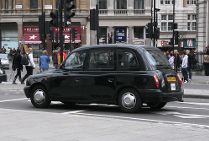London black taxis to go electric by 2020
All new London taxis will be electric by 2020. This measure forms part of Mayor Boris Johnson’s drive to improve air quality in London.

All new London taxis will be electric by 2020. This measure forms part of Mayor Boris Johnson's drive to improve air quality in London.
Johnson's target for a universal fleet of electric black cabs was unveiled as part of the final version of the Mayor's Air Quality Strategy document, published yesterday (14th December).
Road transport is responsible for around 80 per cent of airborne pollution in central London, of which black taxis contribute 20 per cent. To coincide with the release of his strategy, and to encourage London cab drivers to switch to low-emission vehicles, the Mayor announced a £1 million fund offering reduced purchase prices for taxi drivers upgrading to low-emission vehicles.
Johnson said his goal is for London's taxis to "match up to the highest environmental standards that a great city like ours deserves".
"From 2012 when the world heads to London, we will remove the oldest, dirtiest cabs from our streets," he is reported to have said by the Guardian. "But we are also offering a juicy carrot, with the establishment of a fund to help speed up the introduction of electric black cabs. This forms part of a robust package of long-term measures to progressively clean up London's air."
Critics of Johnson's scheme say it is a watered down version of previous plans, which included refusing to grant licences to taxis over 10 years old from 2015. Instead of this Johnson has opted for measures which aim to scrap any taxi over 15 years old from 2012.
Simon Birkett, Director of Clean Air London, is dismissive of the plans.
"The mayor has stumbled again after taking more backward steps on existing and proven air quality measures in the last two and a half years than he is committed to taking over the next 10 years," Birkett said, according to the Guardian.
Johnson is under pressure to produce measures to tackle London's poor air quality, with an estimated 4,267 Londoners dying prematurely each year through long-term exposure to airborne pollutants, according to a report from the Institute of Occupational Medicine Report earlier this year. It found that Bryanston and Dorset Square were the most polluted parts of London, followed by Marylebone High Street and the City of London.
The final version of Air Quality Strategy includes measures to use the planning system to make new developments "air quality neutral", and to introduce energy efficient programmes to reduce emissions from heating of homes and workplaces.
These proposals do not impress Birkett. "London's appalling air pollution is one of the problems facing the capital, leading to 4,300 premature deaths per year and countless thousands suffering ill health. It is therefore bitterly disappointing that the Mayor's strategy, after months in the making, still has a hole at its heart – the lack of effective measures to tackle pollution where it's worst in central London."
Darren Johnson, a Green Party member of the London Assembly is equally unimpressed.
"The London Mayor has dithered and delayed for two and a half years over a half-baked plan that doesn't do the job. He has even taken backward steps by delaying action against polluting white vans and getting rid of the Western Extension of the Congestion Charge. He abolished six monthly inspections of black cabs, but now appears to be reinstating them from 2013."
Johnson mentioned that tackling traffic pollution in London is made more difficult because up to 40 per cent of sources of pollution come from outside London. He also indicated that further work is needed at a national level if the UK is to meet European air quality standards.
The government received a second and final written warning from the European Union during the summer over the UK's breach of Particle Matter 10 (PM10) - dust, soot and other fine particles - levels, with high levels found in the capital.
The Mayor says his strategy will meet European standards on PM10s by 2011. Johnson called on everyone to play their part to improve air quality, especially the national government.
"We are calling on central government to implement new policies and provide funding for several initiatives to tackle this issue across the UK and therefore also London", said the Mayor in the Air Quality Strategy document's foreword.
Author: Leroy Robinson | Climate Action
Image: shining.darkness | Flickr






